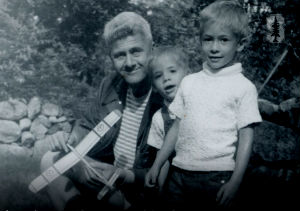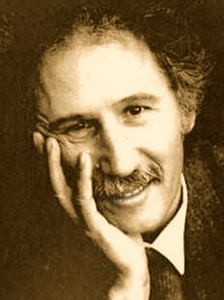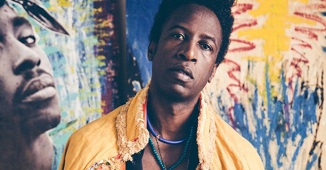De Amerikaanse dichter en literatuurdocent Howard Nemerov werd geboren op 29 februari 1920 in New York. Zie ook alle tags voor Howard Nemerov op dit blog.
Witnessing The Launch Of The Shuttle Atlantis
So much of life in the world is waiting, that
This day was no exception, so we waited
All morning long and into the afternoon.
I spent some of the time remembering
Dante, who did the voyage in the mind
Alone, with no more nor heavier machinery
Than the ghost of a girl giving him guidance;
And wondered if much was lost to gain all this
New world of engine and energy, where dream
Translates into deed. But when the thing went up
It was indeed impressive, as if hell
Itself opened to send its emissary
In search of heaven or ’the unpeopled world’
(thus Dante of doomed Ulysses) ‘behind the sun.’
So much of life in the world is memory
That the moment of the happening itself—
So much with noise and smoke and rising clear
To vanish at the limit of our vision
Into the light blue light of afternoon—
Appeared no more, against the void in aim,
Than the flare of a match in sunlight, quickly snuffed.
What yet may come of this? We cannot know.
Great things are promised, as the promised land
Promised to Moses that he would not see
But a distant sight of, though the children would.
The world is made of pictures of the world,
And the pictures change the world into another world
We cannot know, as we knew not this one.

Howard Nemerov (29 februari 1920 – 5 juli 1991)
Hier met zijn zoontjes Jeremy en Alexander rond 1967
De Amerikaanse schrijver Daniel Handler werd geboren op 28 februari 1970 in San Francisco, Californië Zie ook alle tags Daniel Handler op dit blog.
Uit: A Series of Unfortunate Events – The Bad Beginning (Onder pseudoniem Lemony Snicket)
“If you are interested in stories with happy endings, you would be better off reading some other book. In this book, not only is there no happy ending, there is no happy beginning and very few happy things in the middle. This is because not very many happy things happened in the lives of the three Baudelaire youngsters. Violet, Klaus, and Sunny Baudelaire were intelligent children, and they were charming, and resourceful, and had pleasant facial features, but they were extremely unlucky, and most everything that happened to them was rife with misfortune, misery, and despair. I’m sorry to tell you this, but that is how the story goes. Their misfortune began one day at Briny Beach. The three Baudelaire children lived with their parents in an enormous mansion at the heart of a dirty and busy city, and occasionally their parents gave them permission to take a rickety trolley—the word “rickety,” you probably know, here means “unsteady” or “likely to collapse”—alone to the seashore, where they would spend the day as a sort of vacation as long as they were home for dinner. This particular morning it was gray and cloudy, which didn’t bother the Baudelaire youngsters one bit. When it was hot and sunny, Briny Beach was crowded with tourists and it was impossible to find a good place to lay one’s blanket. On gray and cloudy days, the Baudelaires had the beach to themselves to do what they liked. Violet Baudelaire, the eldest, liked to skip rocks. Like most fourteen-year-olds, she was right-handed, so the rocks skipped farther across the murky water when Violet used her right hand than when she used her left. As she skipped rocks, she was looking out at the horizon and thinking about an invention she wanted to build. Anyone who knew Violet well could tell she was thinking hard, because her long hair was tied up in a ribbon to keep it out of her eyes. Violet had a real knack for inventing and building strange devices, so her brain was often filled with images of pulleys, levers, and gears, and she never wanted to be distracted by something as trivial as her hair. This morning she was thinking about how to construct a device that could retrieve a rock after you had skipped it into the ocean. Klaus Baudelaire, the middle child, and the only boy, liked to examine creatures in tidepools. Klaus was a little older than twelve and wore glasses, which made him look intelligent. He was intelligent. The Baudelaire parents had an enormous library in their mansion, a room filled with thousands of books on nearly every subject. Being only twelve, Klaus of course had not read all of the books in the Baudelaire library, but he had read a great many of them and had retained a lot of the information from his readings.”

Daniel Handler (San Francisco, 28 februari 1970)
Cover
De Amerikaanse schrijver en historicus Dee Brown werd geboren op 28 februari 1908 in Alberta, Louisiana. Zie ook alle tags voor Dee Brown op dit blog.
Uit: Bury My Heart at Wounded Knee
“Two vast new territories were organized, Kansas and Nebraska, encompassing virtually all the country of the Plains tribes. In 1858 Minnesota became a state, its boundaries being extended a hundred miles beyond the 95th meridian, the “permanent Indian frontier.”
And so only a quarter of a century after enactment of Sharp Knife Andrew Jackson’s Indian Trade and Intercourse Act, white settlers had driven in both the north and south flanks of the 95th meridian line, and advance elements of white miners and traders had penetrated the center.
It was then, at the beginning of the 1860s, that the white men of the United States went to war with one another—the Bluecoats against the Graycoats, the great Civil War. In 1860 there were probably 300,000 Indians in the United States and Territories, most of them living west of the Mississippi. According to varying estimates, their numbers had been reduced by one-half to two-thirds since the arrival of the first settlers in Virginia and New England. The survivors were now pressed between expanding white populations on the East and along the Pacific coasts—more than thirty million Europeans and their descendants. If the remaining free tribes believed that the white man’s Civil War would bring any respite from his pressures for territory, they were soon disillusioned.
The most numerous and powerful western tribe was the Sioux, or Dakota, which was separated into several subdivisions. The Santee Sioux lived in the woodlands of Minnesota, and for some years had been retreating before the advance of settlements. Little Crow of the Mdewkanton Santee, after being taken on a tour of eastern cities, was convinced that the power of the United States could not be resisted. He was reluctantly attempting to lead his tribe down the white man’s road. Wabasha, another Santee leader, also had accepted the inevitable, but both he and Little Crow were determined to oppose any further surrender of their lands.”

Dee Brown (28 februari 1908 – 12 december 2002)
Cover luisterboek
De Franse filosoof, schrijver en politicus Michel Eyquem de Montaigne werd geboren in Bordeaux op 28 februari 1533. Zie ook alle tags voor Michel de Montaigne op dit blog
Uit: Over vriendschap (Vertaald door F. de Graaff)
“Zodra de liefde binnen de grenzen van de vriendschap komt, dat wil zeggen op een gemeenschappelijke wil en keuze berust, dan verliest zij haar vuur en kracht. Het genot van de liefde is tevens het einde ervan, omdat dit op het lichaam gericht is en tot verzadiging leidt. Vriendschap daarentegen wordt genoten in de mate waarin ze gewenst wordt, en door dit genot wordt zij gewekt, wortelt ze en bloeit ze op, omdat het geestelijk is en de ziel door het onderhouden ervan meer en meer gelouterd wordt. Die andere, stormachtige affecties hebben bij mij ook tijdens onze volmaakte vriendschap wel gewoed, om van mijn vriend maar niet te spreken, die daarvan maar al te duidelijk getuigt in zijn verzen. Zo hebben beide hartstochten toegang tot mij gehad; ze kenden elkaar, maar hebben nooit met elkaar gewedijverd: de eerste vervolgde zijn hoge en trotse vlucht en zag met verachting neer op de vorderingen van die ander ver beneden zich.
Wat het huwelijk betreft, behalve dat het een contract is, waarvan alleen het afsluiten vrijwillig plaatsvindt (het voortduren ervan is gedwongen en opgelegd en derhalve van andere dingen afhankelijk dan onze wil), en dat gewoonlijk om andere redenen wordt afgesloten, brengt het ontelbare verwikkelingen met zich mee die ontward moeten worden, wat voldoende is om de draad te breken en de ontwikkeling van een sterke gevoelsband te verstoren. Terwijl bij een vriendschap het enige waar men mee te maken heeft en waarmee men moet omgaan, die vriendschap zelf is. En daar komt eerlijk gezegd nog bij dat vrouwen gewoonlijk niet over de vermogens beschikken, die beantwoorden aan de eisen van het soort vertrouwelijke omgang en gedachtenuitwisseling, waardoor die heilige band gevoed wordt. Ook schijnen ze de geestelijke kracht te missen om tegen het knellen van zo’n nauwe en duurzame band bestand te zijn. Nu is het zeker zo dat, als dat niet zo was, als het inderdaad mogelijk was een dergelijke ongedwongen, vrijwillige relatie op te bouwen, waaraan niet alleen de zielen zich volledig kunnen laven, maar ook de lichamen deel kunnen hebben, waarin de hele mens betrokken zou zijn, – dat deze vriendschap dan ongetwijfeld nog volmaakter en totaler zou zijn. Maar uit geen enkel voorbeeld blijkt nog, dat het vrouwelijk geslacht dit heeft kunnen bereiken en de scholen uit de oudheid zijn het erover eens, dat dit hun ook niet gegeven is.”

Michel de Montaigne (28 februari 1533 – 13 september 1592)
Cover
De Roemeense dichter Marin Sorescu werd geboren op 29 februari 1936 in Bulzeşti. Zie ook alle tags voor Marin Sorescu op dit blog.
Chess
I move a white day,
he moves a black day.
I rush forward with a dream,
he takes it from me in war.
He attacks my lungs,
for a year I lie thinking in hospital,
calculate brilliantly
and win a black day.
He displaces a misfortune
and threatens me with cancer
(which at the moment moves diagonally)
but I treat him to a book
and force him to retreat,
take a few other pieces and
notice that half my life has
vanished from the board.
‘I shall call checkmate
and you will lose your optimism’,
he claims.
‘Never mind,’ I try to joke,
’then I’ll switch to feelings and castle your king.’
Behind me my wife, my children,
the sun, the moon and other spectators
tremble at every move I make.
I light a cigarette
and continue the game.
With A green Scarf
With a green scarf I blindfolded
the eyes of the trees
and asked them to catch me.
At once the trees caught me,
their leaves shaking with laughter.
I blindfolded the birds
with a scarf of clouds
and asked them to catch me.
The birds caught me
with a song.
Then with a smile I blindfolded
my sorrow
and the day after it caught me
with a love.
Vertaald door Michael Hamburger

Marin Sorescu (29 februari 1936 – 8 december 1996)
De Amerikaanse dichter, schrijver, acteur, rapper en musicus Saul Stacey Williams werd geboren in Newburgh, New York op 29 februari 1972. Zie ook alle tags voor Saul Williams op dit blog.
Untimely Meditations
CHAPTER 3
Happiness is a mediocre standard
for a middleclass existence. I see
through smiles and smell truth in
the distance. Beyond one dimensional
smiles and laughter lies the hereafter.
Where tears echo laughter.
You’d have to do math to divide a
smile by a tear, times fear, equals
mere truth, that simply dwells in the
air. But if that’s the case all I have
to do is breath and all else will follow.
That’s why drums are hollow.
And I like drums. Drums are good.
But I can’t think straight. I lack the
attention span to meditate. My attention
spans galaxies. Here and now are immense.
Seconds are secular. Moments are mine.
Self is illusion. Music’s divine.

Saul Williams (Newburgh, 29 februari 1972)
Zie voor nog meer schrijvers van de 28e februari ook mijn twee blogs van 28 februari 2016 en ook mijn blog van 29 februari 2016.
Zie voor bovenstaande schrijvers ook mijn blog van 28 februari 2007 en ook mijn blog van 28 februari 2008 en van 29 februari 2008 en eveneens mijn blog van 28 februari 2009.
